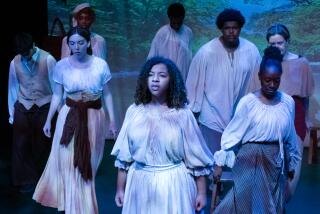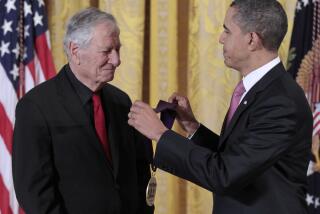Writer, Political Activist Morrie Ryskind Dies at 89
- Share via
Morrie Ryskind, a renegade young socialist-turned-arch-conservative who wrote comedies for the Marx Brothers and won a Pulitzer Prize for the best play of 1932, died early Saturday in Washington of an apparent stroke. He was 89.
The longtime playwright and screenwriter combined show business and political activism through most of his life, including testifying before the House Un-American Activities Committee in 1947 at hearings that resulted in the blacklisting of the “Hollywood 10,” according to his biographer, John Roberts.
Ryskind, who received two Academy Award nominations in more than 20 years of theatrical writing, was born to immigrant Russian parents in Brooklyn and went on to be part of the Class of 1917 at the Columbia University School of Journalism, known as one of the most distinguished classes ever to attend the school.
Ryskind’s fellow students included famed songwriters Lorenz Hart, Richard Rodgers and Oscar Hammerstein II, as well as Herman Mankiewicz, author of “Citizen Kane.”
But Ryskind didn’t graduate with his classmates. The school expelled him six weeks before commencement because, in his crusading socialist zeal, according to his biographer, Ryskind wrote an editorial for the school magazine condemning America’s involvement in World War I. Forty-four years later, Ryskind was a member of the John Birch Society, defending the principles of that right-wing organization in the pages of The Times, for which he wrote a conservative political column from 1960 until 1971. Roberts said he made the political switch because of his antipathy for President Franklin D. Roosevelt and the New Deal.
Ryskind was a longtime friend of President Reagan, according to Roberts, who said Reagan visited the Ryskind home in Beverly Hills shortly after the 1980 election.
Ryskind’s first Broadway hit show was a collaboration with playwright George S. Kaufman, called “Coconuts,” in 1925, starring the Marx Brothers. It was one of several successful partnerships with Kaufman, including “Of Thee I Sing,” which became the first musical to be awarded the Pulitzer Prize for drama in 1932.
Columbia University, impressed with Ryskind’s achievement, finally issued him an honorary bachelor’s degree after the Pulitzer award.
2 Academy Award Nominations
With Kaufman, Ryskind wrote both the Broadway script and the screenplay for “Animal Crackers” (1930), also featuring the Marx Brothers. Among his other credits were “A Night at the Opera” (1935), “My Man Godfrey” (1936) and “Stage Door” (1937). The latter two earned him Academy Award nominations. Ryskind wrote only a few dramas, including “Penny Serenade” in 1941.
Ryskind retired from the theater in 1946 and a year later was a witness before the House committee investigating alleged Communist Party involvement by several noted entertainment figures. By then a staunch anti-communist, Ryskind testified against several numbers of the film world accused of having communist or leftist leanings, according to Roberts.
In 1951, Ryskind was one of several defendants in a successful libel suit brought by playwright Emmet Lavery, who accused Ryskind and others of casting doubt on his loyalty as an American.
Backed National Review
According to Roberts, Ryskind raised large sums of money in 1955 to help launch The National Review, the conservative journal founded by William F. Buckley Jr. After having lived in Beverly Hills since 1937, Ryskind moved to Washington in June to be near his children and grandchildren.
Ryskind is survived by his wife of 56 years, Ruth; a daughter, Ruth Ohman, executive editor of the Journal of American Cardiologists, and a son, Alan, co-owner and editor of the conservative periodical, Human Events. He also is survived by three grandchildren.
Private funeral services will be held in New York.
More to Read
The biggest entertainment stories
Get our big stories about Hollywood, film, television, music, arts, culture and more right in your inbox as soon as they publish.
You may occasionally receive promotional content from the Los Angeles Times.










